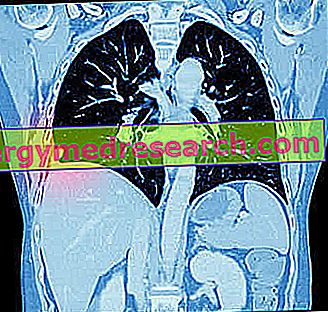Definition
Chickenpox - caused by the Varicella-Zoster virus - is a highly infectious infectious disease with a benign course in most cases. The main problem associated with chickenpox is not so much the disease itself, rather the possible complications: in this regard, vaccination is almost essential.
Causes
Chickenpox is caused by the Herpes Varicella-Zoster virus, belonging to the same viral strain responsible for Shingles and cold sores / genital herpes. The varicella virus is transmitted mainly by airborne means, through the micro particles of saliva dispersed in the air by the infected subject.
The subjects most at risk of chickenpox are the elderly, the immunocompromised, those suffering from renal or respiratory disorders and those who use corticosteroids
Symptoms
Chickenpox is known to all as the disease responsible for the appearance of small red spots, highly itchy, on the skin, which then evolve into bubbles filled with liquid and, finally, into crusts. The skin rash is often accompanied by anorexia, asthenia, widespread chills, migraine, fever, and dry cough.
The information on Varicella - Drugs for Varicella Care does not intend to replace the direct relationship between health professional and patient. Always consult your doctor and / or specialist before taking Varicella - Varicella Medicines for the Treatment of Chicken Pox.
drugs
The drugs listed below are commonly used in the treatment of chickenpox:
Antivirals :
- Acyclovir (eg Efriviral, Aciclovir): administer the drug orally (800 mg) four times a day for 5 days, or intravenously (10 mg / kg body weight) every 8 hours, for a period varying from 7 to 10 days (or until the varicella lesions disappear). For children weighing less than 40 kilos, administer 20 mg / kg of drug 4 times a day for 5 days; if the child weighs more than 40 kilos, the adult dose is recommended.
- Valaciclovir (eg. Talavir, Zelitrex): administer the drug in patients aged between 2 and 18 years at a dose of 20mg / kg three times a day for 5 days; however, the total daily dose should not exceed one gram. The therapy must coincide with the onset of symptoms.
- Foscarnet (eg Foscavir): to be used when the patient does not respond positively to treatment with acyclovir. The dosage must be indicated by the doctor.
Antihistamines (eg Oxatomide (active ingredient); specialty: Tinset): in the form of a cream (topical application), or drops, this drug is recommended to calm the itching. The dosage must be established by the doctor, based on the weight of the subject and the severity of the itchy skin rash.
Antibiotics : to be taken exclusively in case of serious complications (pneumonia, skin infections). The doctor will indicate the drug and the most suitable dosage for the treatment of the disorder.
Paracetamol (eg Acetamol, Tachipirina): take the drug in case of fever associated with chickenpox, orally in the form of tablets, syrup, effervescent sachets or suppositories; it is recommended to take paracetamol at a dosage of 325-650 mg every 4-6 hours for 6-8 consecutive days, to bring down the fever.
Specific immunoglobulins (intramuscularly) attenuate the severity of symptoms. For those at risk of chickenpox, administer the drug 3 or 4 days after exposure to the virus (max. 10 days), even before the onset of symptoms. In this category of drugs, they fall, for example:
- Varitect 25UI / ML IV 5 ML (active ingredient: human antivariculin immunoglobulin for intravenous / intramuscular use): administer 250 mg per day for children up to 5 years, 500 mg for infants aged 6 to 10 years, 750 mg for children between 11 and 15, and 1 gram for those who are already 15 years old. A second dose is recommended after 3 weeks in case of subsequent exposure to the virus.
- Zostavax (active ingredient: attenuated varicella-Zoster virus): the vaccine is in the form of a powder or solvent; mix the drug to get the solution for injection. Inject the vaccine subcutaneously, at the top of the arm.
What changes since 2017
With the decree law on the prevention of vaccination for minors from zero to 16 years, approved on 07/28/2017 , vaccination against chickenpox has become mandatory .
This specific vaccination can be performed with a single injection together with 3 other vaccination covers (the so-called quadrivalent MPRV vaccination, which includes vaccines: anti-measles, anti-rubella, anti-mumps, anti-varicella).
- The vaccination requirement against varicella is in force, in the context of the 10 mandatory vaccinations, only for those born in 2017 .
Please note that compulsory vaccinations are a requirement for admission to nursery schools and kindergartens (for children from 0 to 6 years) and that the violation of the vaccination requirement implies the application of significant financial penalties .
For more information on mandatory vaccines in children, see this article.
Vaccines are contraindicated for immunocompromised subjects, for pregnant women and for those who are sensitive to one or more components of the vaccine.
Measures: in case of chicken pox
- follow a balanced diet and no excesses
- do not take irritating foods for the gastric mucosa (acids, spicy, fats)
- rest
- apply cool powder / lotions on the skin
- avoid scratching / breaking the scabs, although highly itchy
- avoid administering acetylsalicylic acid drugs (possible predisposition to Reye's syndrome) in children under 16 affected by chickenpox



